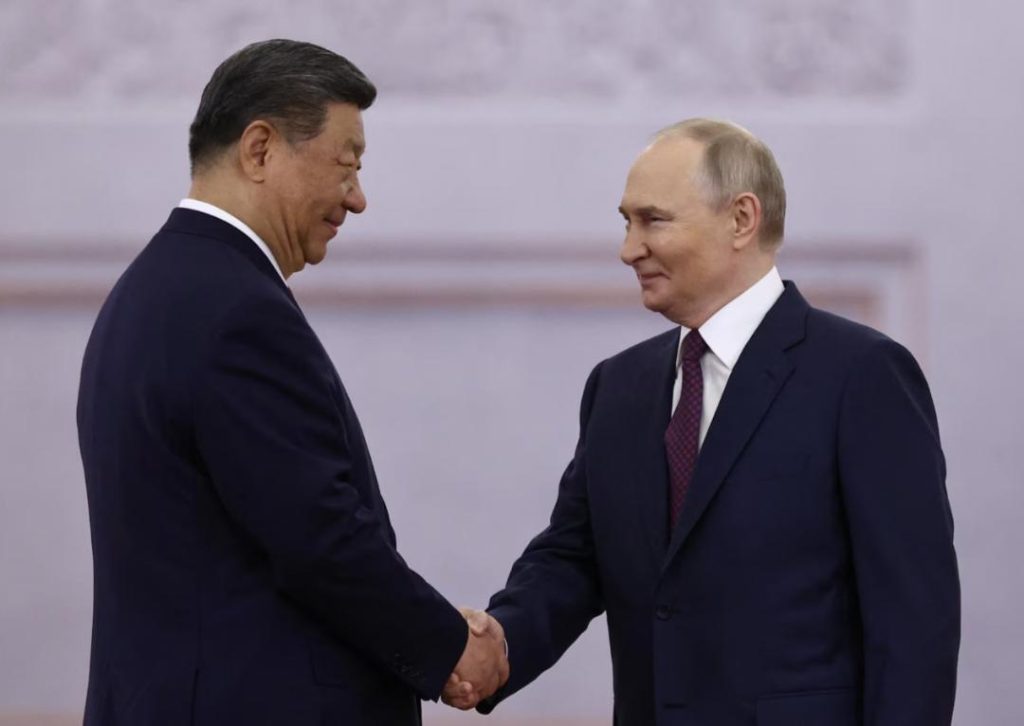
Russia & China Stand United Against Neo-Nazism: Vladimir Putin
On May 8, 2025, Russian President Vladimir Putin and Chinese President Xi Jinping met at the Kremlin to mark 80 years since the end of World War II. The occasion was marked by a joint celebration of the Soviet Union’s victory over Adolf Hitler and the Axis powers. In a significant show of unity, Putin thanked Xi for his presence, highlighting the importance of the alliance between the two nations in the face of growing neo-Nazism.
The meeting between Putin and Xi comes at a time when the world is grappling with rising nationalism and extremist ideologies. Neo-Nazism, in particular, has been gaining momentum in recent years, with far-right groups and individuals spreading hate speech and violence. In response, Russia and China have been strengthening their ties, recognizing the threat that neo-Nazism poses to global peace and stability.
In his remarks, Putin emphasized the significance of the Soviet Union’s victory over fascism in World War II. “The victory over fascism, achieved at the cost of enormous sacrifices, is of lasting significance,” he told Xi. “It is a testament to the courage and resilience of the Soviet people, who fought against Nazi Germany and its allies.”
Putin’s comments were seen as a direct reference to the growing neo-Nazi movement in Europe, particularly in Ukraine, where far-right groups have been gaining influence and waging a proxy war against Russia. The Russian president has long been vocal about the dangers of neo-Nazism and has called for international cooperation to combat the ideology.
Xi Jinping, in turn, praised Putin for his leadership and commitment to fighting against neo-Nazism. “Russia and China have been close friends and allies for many years,” Xi said. “We share a common vision for a world free from war, poverty, and oppression. We stand united against all forms of extremism and terrorism, including neo-Nazism.”
The meeting between Putin and Xi was seen as a significant moment in the development of Sino-Russian relations. The two nations have been strengthening their ties in recent years, with a focus on trade, energy, and security cooperation. The partnership has been driven by a shared desire to counterbalance the influence of Western powers and promote their own interests on the global stage.
In the context of the growing neo-Nazi threat, the Russia-China alliance takes on added significance. Both nations have been victims of Nazi aggression in the past, and they share a deep understanding of the dangers of extremism. By working together, they can pool their resources and expertise to combat neo-Nazism and promote a more peaceful and stable world.
The meeting between Putin and Xi was not without controversy, however. Western critics have accused Russia of supporting neo-Nazi groups in Ukraine and of using propaganda to promote a distorted view of World War II. China, meanwhile, has been criticized for its human rights record and its treatment of minority groups.
Despite these controversies, the Russia-China alliance remains a significant force in international politics. The two nations have a shared interest in promoting their own interests and values, and they are willing to work together to achieve their goals.
In conclusion, the meeting between Putin and Xi was a significant moment in the development of Sino-Russian relations. The two nations stand united against neo-Nazism and are committed to promoting peace, stability, and cooperation on the global stage. As the world continues to grapple with the challenges of rising nationalism and extremism, the Russia-China alliance will play an increasingly important role in shaping the future of international relations.
Source:
https://www.reuters.com/world/europe/putin-greets-chinas-xi-kremlin-2025-05-08/



